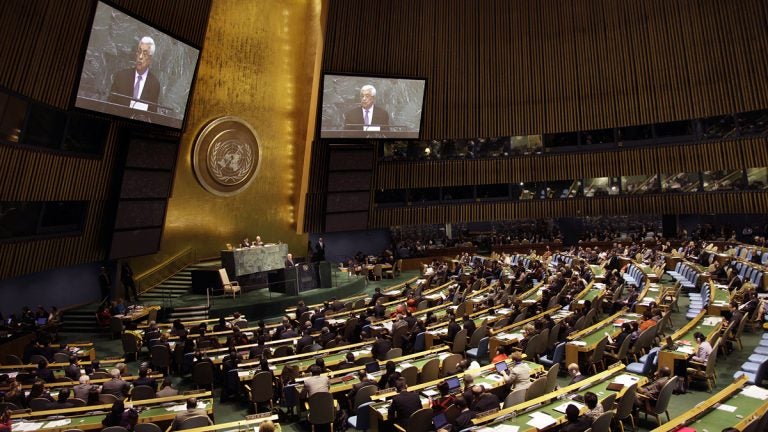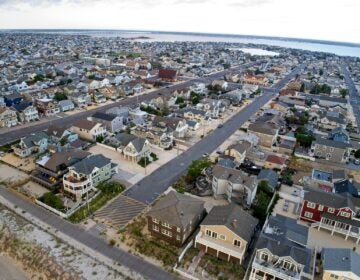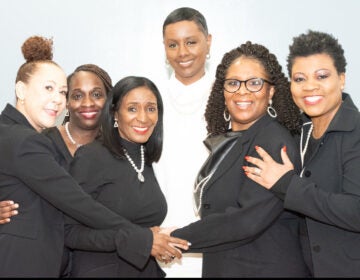Princeton author: U.N. should end its bias against Israel

Palestinian President Mahmoud Abbas calls on the U.N. to admit Palestine as a non-member state in 2012. (AP Photo/Seth Wenig)
This is part of a series from Ilene Dube of The Artful Blogger.
Political passions often lead to heated discussion, but it’s also what has kept Michael Curtis going strong for 90 years. The Distinguished Rutgers Professor Emeritus, political science, and author of more than 35 books will talk about his passions, activism and new book, Jews, Antisemitism, and the Middle East, at the Princeton Public Library at 6:30 p.m. Wednesday, September 11. The talk will be followed by a birthday party for the nonagerian.
Jews, Antisemitism, and the Middle East is an anthology of Curtis’s recent short writings for the online journal The American Thinker. A constant theme is his analysis of the ongoing political, verbal and legal attacks on Israel by various segments of the international community.
“Anti-Semitism or Judeophobia, has existed for centuries,” he said. “One can trace it back to the Greeks and to early Christianity. It is an obsession which is fundamentally inexplicable, because it is manifested in many countries throughout the world, some of which do not contain any Jewish population. It is based on contradictory statements and is the only expression of prejudice or hatred of a people that permeates the whole world. It is not confined to any particular political ideology or class of people or educational or economical level.”
The Princeton resident’s scholarship covers the fields of political theory, comparative government, Western European politics, the European Union, and the United Nations. His textbook on the great political philosophers published in the 1960s is still used throughout the U.S.
Born in London, Curtis grew up in the East End, a Jewish neighborhood. His father was a tailor who made suits for men’s stores on Savile Row. Curtis was educated at the London School of Economics and earned his doctorate from Cornell University. He was one of the founders and president of American Professors for Peace in the Middle East and editor of the Middle East Review. He has received several Fulbright Fellowships and a Bellagio/Rockefeller Institute Fellowship. In addition to his years at Rutgers, he has taught at Yale University, University of Pennsylvania, Oberlin College, Hebrew University, Tel Aviv University and the University of Bologna, and given lectures at hundreds of institutions.
Anti-Semitism is on the rise, he says, for a number of reasons: Young people who grew up well after the Holocaust no longer feel shamed by expressions of anti-Semitism; and the emergence of Islamist extremists, people and organizations, who make no secret of their hatred of Jews. “These extremists interrelate this hatred of Jews with their argument for the elimination of Israel,” he said. “It is unfortunate that the mainstream press is often unfair in articles on Israel stressing only the problems and difficulties and incorrect treatment of Palestinians.”
The self-described political activist says he has been so since he was 13 years old in 1936. “I was part of the group that prevented Oswald Moseley and his Fascist organization from marching through the East End – then the Jewish section of London — on Cable Street. The Six Day War also led me to activism on behalf of Israel.”
Along with other interdisciplinary professors, Curtis formed American Professors for Peace in the Middle East in June 1967. As president of APPME, he appeared regularly on the MacNeil/Lehrer Report during the 1970s and 1980s, speaking on behalf of Israel. APPME was disbanded at the end of the 1980s but Curtis has continued his activism writing books and articles, explaining the Israeli situation and showing the history that has led to the current state of affairs.
“What is surprising and most unacceptable is the increasing acceptance by many in the academic, artistic and generally cultural world of the idea of Palestinian victimhood — indeed of their being the people being most oppressed in the world,” said Curtis. “There are genuine differences over Israeli settlements but they are not the obstacle to peace.
The most fallacious accusation in what has become the politically correct point of view is that Israel is an ‘apartheid’ state, comparable to the infamous South African regime. As a result some, in political parties, academic groups, and mainstream churches, have called for boycotts against Israel. It is essential both to counter this false and ridiculous charge of apartheid and to call on United Nations organizations to end their bias against the state of Israel.”
At 90, Curtis is still going strong. “I feel lucky to have survived so long, and can’t explain this unexpected longevity. My advice is not to believe you are so old, and to remain optimistic. Remain in the game of life. I am still speaking up about what I believe in and I am still an activist in organizations based in New York.”
With his wife, artist, curator and educator Judith Brodsky, he hosts events for important causes as well as opera and jazz.
______________________________________________________
The Artful Blogger is written by Ilene Dube and offers a look inside the art world of the greater Princeton area. Ilene Dube is an award-winning arts writer and editor, as well as an artist, curator and activist for the arts.
WHYY is your source for fact-based, in-depth journalism and information. As a nonprofit organization, we rely on financial support from readers like you. Please give today.




